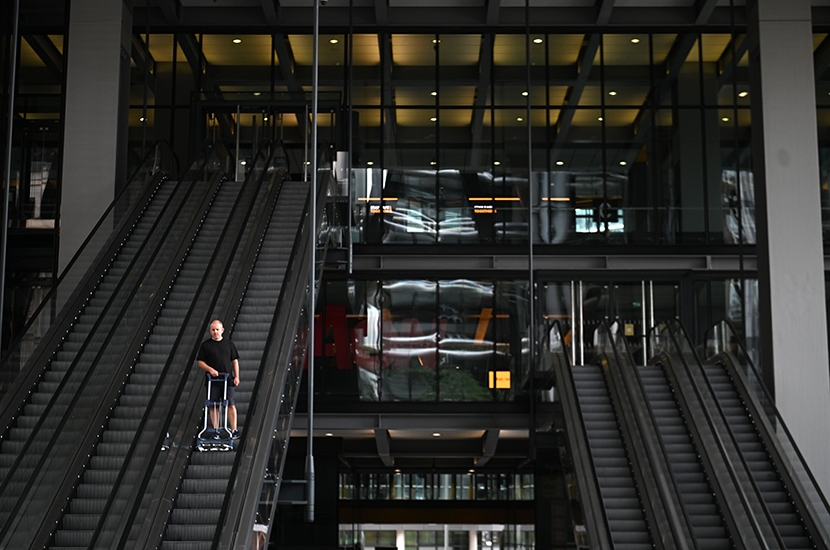This week was built up by the Prime Minister to be the moment that would mark the return of economic and social life to robust health. But there was no real attempt by his government to urge people to go back to the office. Even Number 10 has admitted there never was a back to work campaign. In London, the number of Tube journeys made at the beginning of the week — as good an indicator of economic vitality as any — was still far below last year’s levels. In spite of repeated assurances that returning to school is safe and necessary for children’s health, a YouGov poll suggested that nearly one in five parents are still considering keeping their offspring at home. Recent figures from Scotland indicate they are doing precisely that.
If not now, when? The holidays are over, schools are back, but Britain is still behind every other country in Europe in returning to the office. The problem is not that we are a nation of skivers and laggards. The extra-ordinary response to the ‘eat out to help out’ scheme showed just how well people will respond to a coherent, positive message. There is no doubt about the damage being inflicted on our economy and society, the number of businesses going bust, and the coming rise in unemployment, but there is doubt about what best to do.
Boris Johnson’s premiership was supposed to be a time of rebuilding
This reflects doubt at the very top of Downing Street. The Prime Minister is clearly undecided, torn between wishing to stem the rising tide of unemployment and fear of the virus’s return. As a result, the messages are mixed. The government seems trapped in a cycle of uncertainty, failure and constant retreat. What is the long-term strategy? Is the plan to suppress the virus completely or to find ways to live with it? In these uncertain times, we see uncertain leadership.
Last week, while some ministers were briefing that the government was about to embark upon a back-to-work campaign, the health secretary, Matt Hancock, was talking up the possibility of a second national lockdown. When Sweden saw a rise in cases, its health agency pointed out what ministers in Britain seem slow to realise: what matters is the healthcare caseload, not how many young and healthy people are catching and shrugging off the virus (in many cases, without knowing they ever had it). Britain is now seeing the same trend as Sweden — rising Covid cases but falling hospital numbers. The latter is the metric to watch.
But we have had so many U-turns over the past few months that it has become reasonable to expect the government to announce a policy and then eventually settle on the exact opposite. The algorithm to moderate A-level results wasn’t going to be changed; then it was. One minute the deputy chief medical officer Jenny Harries was telling us that face masks were useless or possibly even worse than useless; the next minute they were made compulsory in many public places. Bolton and Trafford in Greater Manchester were set to be released from local lockdown; 12 hours after that announcement, the decision was reversed.
A pattern has emerged throughout this crisis. At first, the government rejects — on principle — measures that are being introduced in other countries. Then, a few days or weeks later, those measures end up being adopted here in an especially tough form. It happened with lockdown and it happened with travel quarantine. From February to May, the government declined to place any restrictions on people travelling to Britain. Then, as cases declined, suddenly every traveller arriving here from abroad was forced to quarantine. Then air bridges were announced to encourage the revival of tourism, yet that has been undermined by constantly chopping and changing which countries are on the list.
At the end of this week, we see many restaurants as busy as they were before the pandemic. This is not just due to the Chancellor’s giveaways. The government sent a clear message inviting people to support the places they do not wish to see closed. But tumbleweed is still blowing down far too many once-thriving city streets. Britain has come to resemble a cruise ship where the restaurants are doing a fine trade, but where captain, chief mate and engineers are arguing on the bridge and there is no one in the crow’s nest to spot the approaching icebergs.
The return to school has exposed just how far children have been left behind. They have lost three months of progress, according to a poll of teachers, with the already wide gap between the least and most dis-advantaged pupils opening into a chasm.
Boris Johnson’s premiership was supposed to be a time of rebuilding after the bruising experience of Brexit. He originally imagined years spent on projects like civil service reform, dualling the A1, ‘levelling up’ the north of England, and building carbon-neutral jumbo jets. But his premiership has been overtaken by the biggest political and economic crisis in Britain’s post-war history, one where the most important factor is the confidence of the country.
The Prime Minister still has the ability to embody what Thatcher, speaking at Reagan’s funeral, described as ‘the great cause of cheering us all up’. But we have seen very little of this in recent months. His natural enthusiasm has been wasted.
For much of the year, he has had to encourage people to hunker down. It’s now time to encourage this country to get back to work, so the great job of national repair can begin.






Comments